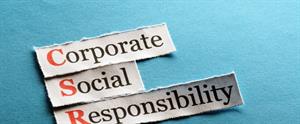
Once viewed as a parallel endeavor in order to satisfy a minority of environmentally concerned customers, sustainability is now a key element of core business operations.
Ignoring sustainability today would lead to certain business failure in any industry. Not only is the world increasingly conscious of man-made environmental decay, but businesses are also starting to realize that a focus on sustainability is paramount to maintaining long-term business continuity, price control and risk management. The rise of new world super powers, such as China and India, has intensified competition for limited natural resources; there is increasing legislation over carbon dioxide emissions and water usage and, simply, consumers are placing higher importance on sustainability in their personal consumption choices. These are just some of the reasons that have pushed sustainability in front of the corporate looking glass, and why the number of Chief Sustainability Officers appointed to the Fortune 500 C-Suites is doubling year-on-year.
Where does Corporate Social Responsibility fit in?
Corporate Social Responsibility (CSR) refers to a business’s program of assessing and responding to the affect of their operation on environmental and social wellbeing (over and above what is required by law). CSR is taking the same journey into business prominence as the sustainability field (indeed, from the environmental perspective, there is a lot of overlap between the two fields), but is encountering much more resistance in making it to the forefront of business leaders attention.
Events such as the 2013 structural failure of an eight-story garment factory, the Savar building, in Dhaka, Bangladesh that killed over 1,100 people, highlight for many the enormous ethical business gaps that CSR seeks to address. The factory, producing clothes for commonplace American stores such as Walmart, The Children’s Place and Benetton, paid workers $30 per month. Unsafe, overcrowded conditions and a lack of any discernable health and safety protocol made it impossible for many to safely evacuate when the building began to collapse, and warnings made the day before after cracks appeared were ignored by foremen and workers afraid at the threat of lost wages.
Despite the exposure and public outcry at the time, three years later a study by NYU’s Stern Center for Business and Human Rights reports an alarming lack of progress towards any substantive change. Despite commitments from both major multinational companies and governmental agencies to tighten legislation and safety protocol, out of 3,425 inspections of Bangladeshi factories undertaken by the study in December 2015, only 8 have remedied violations enough to pass an inspection to new standards created after the disaster. The same inertia is seen all around the world despite the continuing exposure of human rights violations in major multinational supply chains.
The extent of these failings is both facilitated by and hidden by a massive extent of sub-contracting. Not only does this practice allow a large degree of sourcing to remain under the legislative radar (retaining illegal working conditions for cheaper production), but also it permits major brands to escape direct blame by turning it towards their direct contractors.
With no company wishing to be ‘first-past-the-post’ in a major CSR overhaul of their supply chain that would lose the price competitiveness facilitated by unethical practice, this latest stagnation demonstrates that change has to be driven at the legislative and compliance level, and by increased consumer scrutiny. With an absence of tight, compulsory legislation that protects workers at all levels of a supply chain, the vast majority simply will avoid compliance until major reform is introduced at the national government and international body level (such as through the UN and World Trade Organization).
